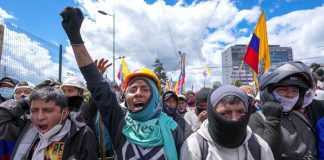The disappearance of 43 students in Mexico, after they were kidnapped by police and drug traffickers, has thrown the country into turmoil, exposing the close connections between the political elite and drug gangs.
The students, called normalistas, were from peasant families studying to work as teachers in their communities.
Their teacher training college in Ayotzinapa is known as a hotbed of left-wing political activism and has a long history of support for social justice movements, with murals of Marx, Engels, Che Guevara, Zapata and other revolutionary leaders adorning its buildings. On the day of the abduction and killings, the students were protesting cuts to rural schools and soliciting funds to travel to Mexico City to take part in a march commemorating the 1968 Tlatelolco student massacre by the then PRI government.
They ended up in the small city of Iguala, in the southern Mexican state of Guerrero, to commandeer buses, a traditional Mexican method of securing transport to protests.
What they didn’t know was that the politically ambitious wife of Iguala’s mayor, José Luis Abarca, was giving a speech that evening. Her brother is reputedly the leader of the narco-trafficker gang Guerreros Unidos. Police opened fire on the students on the buses, killing six people and injuring 20, including bystanders.
Police have admitted to taking the remaining 43 students and handing them over to Guerros Unidos. Gang members have now confessed to murdering the students, but tests are yet to confirm whether their bodies have been recovered.
Protests raising slogans such as “We want them back alive” and “We are all Ayotzinapa”, have led to the resignation of the state governor and the flight of the mayor of Iguala. Mass mobilisations torched the parliament building in the students’ state of Guerrero, and led to riots and the burning of the doors of the national palace.
The discovery of 19 additional mass graves in the area, as a result of the search for the bodies of the missing students, has exposed the scale of Mexico’s drug war, which has seen an estimated 120,000 killed since 2006.
Police arrested over the incident have received support from the drug-trafficking group linked with the abductions, who are threatening to kill innocents and release the names of officials linked with the gang if the police officers are not released.
In a nation that has become accustomed to horror stories of mass killing and political corruption, this incident has mobilised the population, bringing to the surface the close relationship between the state and narco-trafficking.
By Camilo Haley





